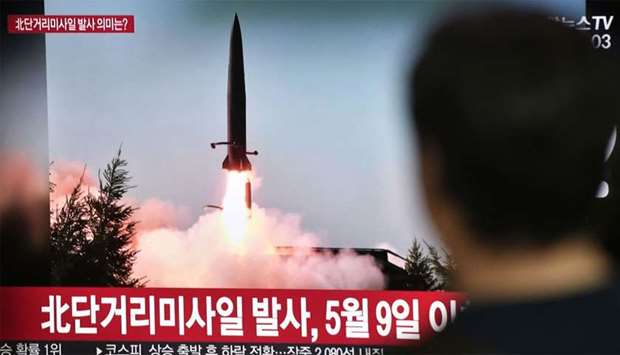North Korea fired two short-range missiles into the sea off its eastern coast on Thursday, South Korea's Joint Chiefs of Staff (JCS) said, despite hopes that Pyongyang may soon resume talks with the United States on its nuclear programme.
North Korea had fired the missiles at 5:34 am (2034 GMT) and 5:57 am from Wonsan into the East Sea, also known as the Sea of Japan, the JCS said. They flew about 430 kilometres and reached an altitude of 50 kilometres.
‘Our military is closely monitoring the situation in case of additional launches while maintaining a readiness posture,’ it said.
The JCS added that South Korean and US intelligence authorities were analysing exactly what Pyongyang had fired.
The Standing Committee of the National Security Council in Seoul said early reports showed Pyongyang had used a new type of short-range ballistic missile, but that it needed to make a final assessment.
Such tests are ‘not helpful to the efforts of easing military tensions on the Korean Peninsula,’ added the committee.
Japanese Defence Minister Takeshi Iwaya told reporters the launch was ‘extremely regrettable.’ ‘If they were ballistic missiles, that would violate a UN Security Council resolution,’ Iwaya said.
‘We will continue to make efforts to collect and analyse information while coordinating with the United States and South Korea,’ he added.
Kyodo news agency cited an unnamed Japanese government official as saying that the missiles fell into the sea before reaching Japan's exclusive economic zone and posed no security threat.
North Korea last carried out a major weapons test in early May.
The latest launches come weeks after North Korean leader Kim Jong Un and US President Donald Trump agreed to relaunch stalled talks on North Korea's nuclear weapons programmes and economic sanctions.
Their unexpected meeting in the Demilitarized Zone (DMZ) between the two Koreas at the end of June revived hopes of progress after the pair's failed second summit in Vietnam in February.
Last week, however, Pyongyang had warned that an August joint military exercise planned by Seoul and Washington could have potential consequences for the dialogue.

